本试题 “短文改错This autumn my class went to Dalian to go the camping. We arrived at a sandy beachwith a well view of the sea. We set up our tents on the s...” 主要考查您对人称代词
形容词
副词
介词和介词短语
动词
一般过去时
感叹句
状语从句
等考点的理解。关于这些考点您可以点击下面的选项卡查看详细档案。
- 人称代词
- 形容词
- 副词
- 介词和介词短语
- 动词
- 一般过去时
- 感叹句
- 状语从句
人称代词的概念:
人称代词是替代我、你、他、她、它、我们、你们、他们、她们、它们等人称的词。
人称代词分为主格和宾格形式,并有人称的单复数形式。按所替代人称的不同分为第一人称、第二人称和第三人称。
人称代词的用法:
人称代词在句中可以用作主语(用主格,如:I,you,he,she,we,they,等)和宾语(用宾格,如 me,you,him,her,us,them等)
如:He loves her, but she hates him. 他爱她,但她却讨厌他。
注:(1)在口语中,当人称代词用作表语、用于than, as之后或用于强调句中被强调时,可以用语。 例如:
"Who is it?" "It's me."“是谁呀?”“是我。”
He sings better than me. 他比我唱得好。
He is as tall as her. 他和她一样高。
It's me who did it. 这是我干的。但是,若than,as后的人称代词后跟有动词,则必须用主格。例如:
He sings better than I do./ He is as tall as she is.
(2)单独使用的人称代词通常用宾格。
"I' m tired.""Me too."“我累了。”“我也累了。”
"Who wants this?" "Me."“谁要这个?”“我要。”
(3)有时用主格或宾格会导致意思的变化。
I like you better than he. 我比他更喜欢你。为 I like you better than he likes you. 之略。
I like you better than him. 我喜欢你胜过喜欢他。为 I like you better than he likes him. 之略。
人称代词主格、宾格、人称、单复数对比:
|
人称代词 |
单数 |
复数 | ||
|
主格 |
宾格 |
主格 |
宾格 | |
|
第一人称 |
I |
me |
we |
us |
|
第二人称 |
you |
you |
you |
you |
|
第三人称 |
he |
him |
they |
them |
|
she |
her |
them | ||
|
it |
it | |||
人称代词的排序:
人称代词的排列顺序为:单数人称代词通常按“二三一”排列,即you, he and I;复数人称代词通常按“一二三”排列,即we, you and they:
You, he and I are of the same age. 你,他和我都是同一年龄。
We, you and they are all good citizens. 我们,你们和他们都是好公民。
但若是用于承担责任或错误等场合,则可把第一人称I置于其他人称代词之前:
I and Tom are to blame. 我和汤姆该受批评。
比较:Tom and I hope to go there. 汤姆和我想去那儿。
注意:you and I 是固定结构,语序通常不宜颠倒。
人称代词知识体系:
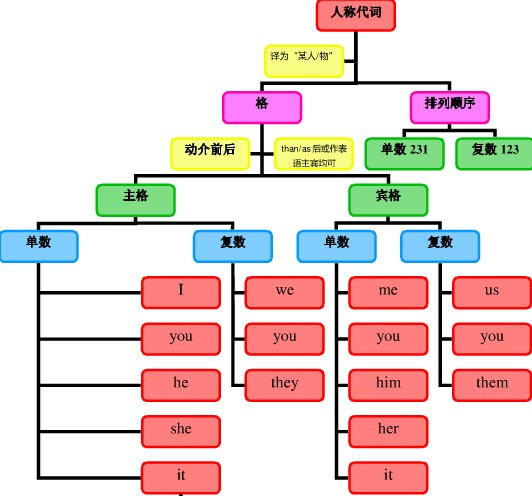
人称代词用法拓展:
1、在通常情况下,人称代词在句子中出现在它所代替的名词之后,即先出现名词,再出现相应的代词。但是,在书面语中,有时也可出现代词,后出现代词所代替的名词。
As soon as it had hopped off, the plane picked up speed.飞机刚一起飞,就加了速。
(比较:As soon as the plane had hopped off, it picked up speed.)
2、人称代词后跟名词同位语。有些人称代词后有时可跟同位语。
These small desks are forus students.这些小课桌是给我们学生的。
We girls often go to the movies together.我们女孩子常一起去看电影。
He asked you boys to be quiet.他要你们男孩子安静些。
形容词的概念:
形容词(adjective),简称adj.或a,形容词用来修饰名词或代词,表示人或事物的性质、状态,和特征的程度好坏与否,形容词在句中作定语、表语、宾语补足语。通常,可将形容词分成性质形容词和叙述形容词两类,其位置不一定都放在名词前面。
形容词的作用与位置:
形容词是用来修饰名词的,常被放在名词前作定语,或放在系动词后面作表语。以下属几种特殊情况,须牢记;
(1)形容词短语作定语,定语后置。
如:a language difficult to master,
a leaning tower about 180 feet high
(2)表语形容词(afraid、alike、alone、asleep、awake、alive等)作定语,定语后置。如a man alive。有些表身体健康状况的形容词如well、faint、ill只作表语。sick既可作表语又可作定语,ill如作定语意为“bad”。
(3)用作定语,修饰由不定代词one、no、any、some和every构成的复合词如anything、something等时,通常后置。
如:I have something important to tell you.
(4)else常用作疑问代词和不定代词的后置定语。
(5)enough、nearby修饰名词前置或后置,程度副词一般位于形容词、副词前面,enough修饰形容词、副词时,必须后置。
(6)几个并列的形容词作定语,其语序通常为:限定语(The、A)+描绘性形容词+size(大小)+shape(形状)+age(年龄、时间)+color(颜色)+origin(国籍、来源)+material(材料)+purpose(目的)+名词。
口诀:
限定描绘大长高,形状年龄和新老;颜色国籍跟材料,作用类别往后靠。
如:a heavy black Chinese steel umbrella,
the man's first tow interesting little red French oil paintings
形容词的用法:
1、形容词修饰名词,说明事物或人的性质或特征。通常,可将形容词分成性质形容词和叙述形容词两类,其位置不一定都放在名词前面:
1)直接说明事物的性质或特征的形容词是性质形容词,它有级的变化,可以用程度副词修饰,在句中可作定语、表语和补语。例如:hot热的。
2)叙述形容词只能作表语,所以又称为表语形容词。这类形容词没有级的变化,也不可用程度副词修饰。
大多数以a开头的形容词都属于这一类。例如:
afraid害怕的。(错)Heisanillman. (对)Themanisill. (错)Sheisanafraidgirl. (对)Thegirlisafraid.
这类词还有:well,unwell,ill,faint,afraid,alike,alive,alone,asleep,awake等。
3)形容词作定语修饰名词时,要放在名词的前边。但是如果形容词修饰以-thing为字尾的词语时,要放在这些词之后。例如:somethingnice
2、用形容词表示类别和整体:
1)某些形容词加上定冠词可以泛指一类人,与谓语动词的复数连接。如:the dead,the living,the rich,the poor,the blind,the hungry The poorarelosinghope.穷人失去了希望。
2)有关国家和民族的形容词加上定冠词指这个民族的整体,与动词的复数连用。如:the British,the English,the French,the Chinese. The English have wonderful senseofhumor.
以-ly结尾的形容词:
1)大部分形容词加-ly可构成副词。但friendly,deadly,lovely,lonely,likely,lively,ugly,brotherly,仍为形容词。改错:
如:(错)She sang lovely.
(错)He spoke to me very friendly.
(对)Her singing was lovely.
(对)He spoke to me in a very friendly way.
2)有些以-ly结尾既为形容词,也为副词。 daily,weekly,monthly,yearly,early .
如:The Times is a daily paper.
The Times is published daily.
形容词知识体系:
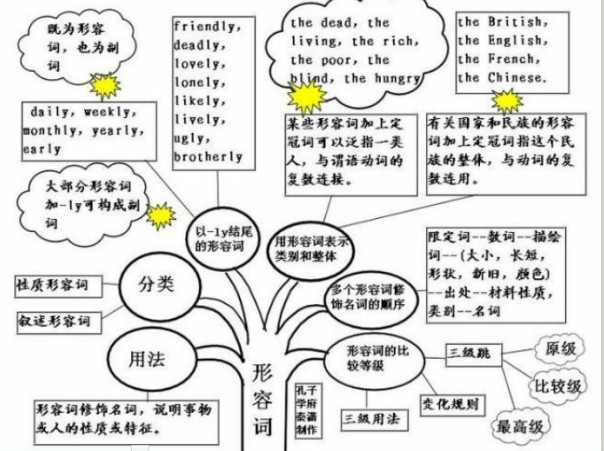
复合形容词的构成:
(1)形容词+名词+ed:
如:kind-hearted 好心的,white-haired 白发的
(2)形容词+形容词:
如:red-hot 炽热的,dark-blue 深蓝的
(3)形容词+现在分词:
如:good-looking 好看的,easy-going 随和的
(4)副词+现在分词:
如:hard-working 勤劳的,fast-moving 快速转动的
(5)副词+过去分词:
如:hard-won 得来不易的,newly-made 新建的
(6)名词+形容词:
如:life-long 终生的,world-famous 世界闻名的
(7)名词+现在分词:
如:peace-loving 爱好和平的,fun-loving 爱开玩笑的
(8)名词+过去分词:
如:snow-covered 白雪覆盖的,hand-made 手工的
(9)数词+名词+ed:
如:four-storeyed 4层楼的,three-legged 3条腿的
(10)数词+名词(名词用单数):
如:ten-year 10年的, two-man 两人的
副词的概念:
副词是指在句子中表示行为或状态特征的词,用来修饰动词、形容词、其他副词、介词短语、非谓语动词乃至整个句子,表示时间、地点、程度、方式等概念。
副词的位置:
1)在动词之前。
2)在be动词、助动词之后。
3)多个助动词时,副词一般放在第一个助动词后。
注意:
a. 大多数方式副词位于句尾,但宾语过长,副词可以提前,以使句子平衡。
如:We could see very clearly a strange light ahead of us.
b. 方式副词well,badly糟、坏,hard等只放在句尾。
如:He speaks English well.
副词的排列顺序:
1)时间,地点副词,小单位的在前,大单位在后。
2)方式副词,短的在前,长的在后,并用and或but等连词连接。
如:Please write slowly and carefully.
3)多个不同副词排列:程度+地点+方式+时间副词。
注意:副词very可以修饰形容词,但不能修饰动词。
改错:(错)I very like English.
(对)I like English very much.
注意:副词enough要放在形容词的后面,形容词enough放在名词前后都可。
如:I don't know him well enough.
There is enough food for everyone to eat.
There is food enough for everyone to eat.
兼有两种形式的副词:
1)close与closely:
close意思是“近”;closely意思是“仔细地”。
如: He is sitting close to me.
Watch him closely.
2)late与lately:
late意思是"晚";lately意思是“最近” 。
如:You have come too late.
What have you been doing lately?
3)deep与deeply:
deep意思是“深”,表示空间深度;deeply时常表示感情上的深度,“深深地” 。
如:He pushed the stick deep into the mud.
Even father was deeply moved by the film.
4)high与highly:
high表示空间高度;highly表示程度,相当于much。
如:The plane was flying high.
I think highly of your opinion.
5)wide与widely:
wide表示空间宽度;widely意思是“广泛地”,“在许多地方”。
如:He opened the door wide.
English is widely used in the world.
6)free与freely:
free的意思是“免费”;freely的意思是“无限制地”。
如:You can eat free in my restaurant whenever you like.
You may speak freely, say what you like.
副词知识体系:
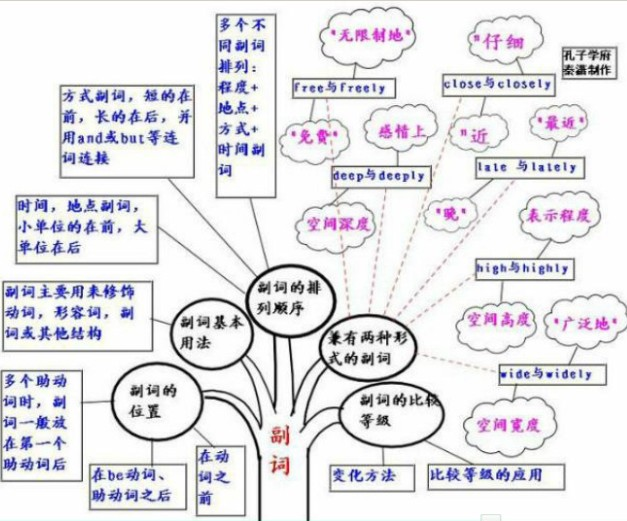
介词和介词短语的概念:
介词是一种用来表示词与词、词与句之间的关系的虚词,在句中不能单独作句子成分。介词后面一般有名词、代词或相当于名词的其他词类,短语或从句作它的宾语。介词和它的宾语构成介词词组,在句中作状语,表语,补语或介词宾语。介词可以分为时间介词、地点介词、方式介词和其他介词。
误用介词的三种情况:
1、多用介词:
多用介词可能是受汉语意思的影响将及物动词误用作不及物动词,也可能是受相关结构的影响而用错:
误:We discussed about the plan.
正:We discussed the plan. 我们讨论了计划。
误:Did he mention about the accident?
正:Did he mention the accident? 他提到那次事故了吗?
误:I saw her enter into the bank.
正:I saw her enter the bank. 我看见她进了银行。
误:He married with[to] a nurse.
正:He married a nurse. 他同一位护士结了婚。
误:How can contact with you?
正:How can contact you? 我怎么与你联系?
误:We should serve for the people heart and soul.
正:We should serve the people heart and soul. 我们应该全心全意地为人民服务。
误:Who controls over the factory? (但名词control可接over)
正:Who controls the factory? 谁管理这个工厂?
误:He has a great many of friends here. (比较a great number of)
正:He has a great many friends here. 他在这儿有很多朋友。
2、漏用介词:
漏用介词可能是受汉语意思的影响将不及物动词误用作及物动词,或是受相关结构的影响的影响而用错等:
误:This matter is difficult to deal. (deal with=处理)
正:This matter is difficult to deal with. 这事很难处理。
误:He is not a man to be depended.
正:He is not a man to be depended on. 他不是个可靠的人。
误:He took a cup of tea, and went on the story.
正:He took a cup of tea, and wentonwiththestory.他喝了一口茶,又接着讲故事。
误:My mother still regards me a child. (比较consider…as中的as可省略)
正:My mother still regards me as a child. 我母亲还把我当小孩看。
误:They insisted sending a car over to fetch us.
正:They insisted on sending a car over to fetch us.他们坚持要派车来接我们。
误:What he says is worth listening.
正:What he said is worth listening to.他的话值得一听。
3、错用介词:
错用介词的情况比较复杂,可能是因受汉语意思的而错,也可能是因弄不清搭配关系而错,可能是混淆用法而错,也可能是受相关结构的影响而错,可能是忽略语境而错,也可能是想当然的用错:
误:She called on his office yesterday. (call on+人,call at+地点)
正:She called at his office yesterday. 她昨天去了他办公室拜访。
误:He is engaged with a nurse.
正:He is engaged to a nurse.他与一位护士订了婚。
误:The sun rises from the east.
正:The sun rises in the east.太阳从东方升起。
误:Under his help, I finished it in time.
正:With his help, I finished it in time. 在他的帮助下,我及时做完了。
误:During he was in Japan, he visited many places.
正:During his stay in Japan, he visited many places.他在日本期间,参观过许多地方。
误:We are familiar to his character.
正:We are familiar with his character.我们了解他的性格。
误:Help yourself with the fruit.
正:Help yourself to the fruit.吃点水果吧。
介词的宾语:
1、名词或代词作介词宾语:
如:Are you interested in history? 你对历史感兴趣吗?
Don't worry about it. 别为它担心。
注:若是人称代词用作介词宾语,要注意用宾格。
如:No one can sing like her. 没有人能像她那样唱歌。(不能用like she)
2、动名词作介词宾语:
如:He is good at telling stories. 他善于讲故事。
In crossing the street he was run over. 他在穿过马路时被汽车撞倒。
3、过去分词作介词宾语:
如:We can't regard the matter as settled. 我们不能认为这事已经解决。
I take it for granted you have read the book. 我以为你读过这本书。
注:过去分词用作介词宾语通常只见于某些固定结构中,如上面第1句涉及regard…as(认为…是)结构,第2句涉及take sth for granted(认为某事属实)。在其他情况下,介词后通常不直接跟过去分词作宾语,若语义上需要接过去分词(表被动),可换用“being+过去分词”:
如:He went out without being seen by the others.他出去了,没有被其他人看见。
4、从句作介词宾语:
如:He was not satisfied with what she said. 他对她说的不满意。
I'm worried about where he is. 我担心他上哪儿去了。
注:介词后通常不接that从句,遇此情况需考虑用其他结构:
误:He paid no attention to that she was poor.
正:He paid no attention to the fact that she was poor. 他根本不注意她很穷这一事实。
但有个别介词(如except)可接that从句。
比较:I know nothing about him except that he lives next door./I know nothing about him except for the fact that he lives next door. 我只知道他住在隔壁,其它的就不知道了。
5、不定式作介词宾语:
如:I had no choice but to wait. 除了等,我没有别的选择。
He wanted nothing but to stay there. 他只想留在那儿。
They did nothing but complain. 他们老是一个劲地抱怨。
He never did anything but watch TV. 除了看电视,他从不干任何事。
注:(1)介词后接不定式的情形通常只见于but, except等极个别个词。该不定式有时带to,有时不带to,其区别是:若其前出现了动词do,其后的不定式通常不带to;
若其前没有出现动词do,则其后的不定式通常带to。
(2)介词后虽然通常不直接跟不定式作宾语,但却可接“连接代词(副词)+不定式”结构:
如:He gave me some advice on how to do it. 对于如何做这事他给我提了些建议。
6、形容词作介词宾语:
如:Her pronunciation is far from perfect. 她的语音远不是完美的。
In short, we must be prepared. 总而言之,我们要有准备。
Things have gone from bad to worse. 事情越来越糟。
注:(1)有些形容词用作介词宾语可视为其前省略了动名词being:
如:He regarded the situationas(being) serious. 他认为形势严重。
His work is far from(being) satisfactory. 他的工作丝毫不令人满意。
(2)有些“介词+形容词”的结构已构成固定搭配:in full全部地,全面地,无省略地; in private私下地,秘密地; in particular特别地;in general一般地,通常地,概括地; in brief 简言之;in short总之,简言之; in vain徒然地,徒劳无益地;for fee免费地,无偿地; for certain肯定地,确切地;for sure肯定地,确切地; for short为了简短,简称;atl arge自由自在地,逍遥法外; by far…得多
7、副词作介词宾语:
如:I can't stay for long. 我不能久呆。
It's too hot in here. 这里面太热了。
I looked every where except there. 除了那儿,我到处都看过了。
8、数词作介词宾语:
如:The city has a population of four million. 这座城市有四百万人口。
He was among the first to arrive. 他是第一批到的。
9、介词短语作介词宾语:
如:Choose a book from among these. 从这些书中选一本吧。
I saw her from across the street. 我从街的对面望见了她。
注:通常可后接介词短语作宾语的介词是from, till, until, since, except, instead of等。
比较:I took it from the bed. 我从床那儿(或床上)拿的。
I took it from under the bed. 我从床下拿的。
10、复合结构用作介词宾语:
如:She had no objection to Mary marrying him. 她不反对玛丽与他结婚。
She came in with a book in her hand. 她手里拿着一本书走了进来。
All the afternoon he worked with the door locked. 整个下午他都锁着门在房里工作。
介词短语的句法功能:
1、表语:
如:He was with a friend. 他和一个朋友在一起。
Health is above wealth. 健康胜过财富。
This knife is for cutting bread. 这把小刀是用于切面包的。
注:有些介词(如because of)引出的短语通常只用作状语,不用作表语:
误:His absence is because of the rain.
正:His absence is due to the rain. 他因雨未来。
但是,若主语是代词(不是名词),becauseof引出的短语可用作表语:
如:It is because of hard work. 那是因为辛苦工作的原因。
2、状语:
如:Don't touch it with your hands. 别用手去摸它。
Did you do this by design or by accident? 你这样做是有意的还是无意的?
3、定语:
如:This is his reply to your letter. 这是他给你的回信。
This is the best way of doing it. 这是做此事最好的方法。
My love for you is deeper than the sea. 我对你的爱比海深。
4、宾语补足语:
如:I found everythingin good condition. 我发现一切正常。
Her illness kept her in bed for a week. 她因生病在床上躺了一星期。
注:用作宾语补足语的介词短语在相应的被动语态中则为主语补足语:
如:He was regarded as a hero. 他被看成是英雄。
5、宾语:
如:A man stepped out from behind the wall. 一个人从墙后走出来。
He cannot spare anytime except on Sunday. 除星期日外,他抽不出时间。
6、主语:
如:Between6 and 7 suits me. 六点到七点对我比较适合。
After the exams is the time to relax. 考试后是轻松一下的时间。
注:介词短语通常不用作主语,尽管有时也像上面这样用作主语,但通常可视为是在一定的上下文中有所省略:
如:—When are we going to have the next meeting? 我们下次什么时候见面?
—On Tuesday may be convenient. 星期二可能比较方便。
此句中onTuesday虽用作主语,但可视为是其前省略了meeting一词:
即:Meeting during the vacation may be convenient.
动词的定义:
表示动作中状态的词叫做动词。根据其在句中的功能,动词可分为行为动词、系动词、助动词和情态动词四类,有些动词是兼类词。
例如:We have lunch at 12. (have是行为动词)
We have been to NewYork. (have是助动词)
I am hungry. (am是系动词)
You need not have waited for me. (need是情态动词)
The door needs painting. (need是兼类词)
动词的分类:
1)表示动作中状态的词叫做动词。
2)根据其在句中的功能,动词可分为四类,分别是:
实义动词(Notional Verb)、系动词(Link Verb)、助动词(Auxiliary Verb)、情态动词(Modal Verb)。
说明:有些情况下,有些动词是兼类词。
例如:We are having a meeting. 我们正在开会。(having是实义动词。)
He has gone to NewYork.他已去纽约。(has是助动词。)
3)动词根据其后是否带有宾语,可分为两类,分别是:
及物动词(Transitive Verb)、不及物动词(Intransitive Verb),缩写形式分别为vt.和vi.。
说明:同一动词有时可用作及物动词,有时可用作不及物动词。
例如:She can dance and sing. 她能唱歌又能跳舞。(sing在此用作不及物动词。)
She can sing many English songs. 她能唱好多首英文歌曲。(sing用作及物动词。)
4)根据是否受主语的人称和数的限制,可分两类,分别是:
限定动词(Finite Verb)、非限定动词(Non-finite Verb)。
例如:She sings very well. 她唱得很好。(sing受主语she的限制,故用第三人称单数形式sings。)
She wants to learn English well. 她想学好英语。(to learn不受主语she的限制,没有词形变化,是非限定动词。
说明:英语中共有三种非限定动词,分别是:动词不定式(Infinitive)、动名词(Gerund)、分词(Participle)。
5)根据动词的组成形式,可分为三类,分别是:
单字词(One-Word Verb)、短语动词(Phrasal Verb)、动词短语(Verbal Phrase)
例如:The English language contains many phrasal verbs and verbal phrases. 英语里有许多短语动词和动词短语。(contains是单字动词。)
Students should learn to look up new words in dictionaries. 学生们学会查字典。(look up是短语动词。)
The young ought to take care of the old. 年轻人应照料老人。(takecareof是动词短语。)
6)动词有五种形态,分别是:
原形(OriginalForm)、第三人称单数形式(Singular From in Third Personal)、过去式(Past Form)、过去分词(Past Participle)、现在分词(Present Participle)。
动词知识体系:
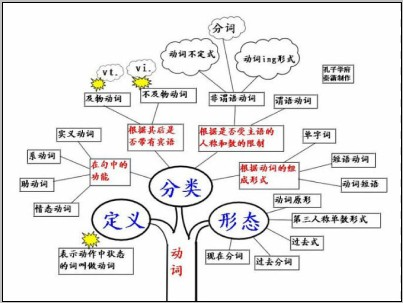
一般过去时的概念:
一般过去时表示过去某个时间里发生的动作或状态;过去习惯性、经常性的动作、行为;过去主语所具备的能力和性格。
一般过去时的用法:
1、表示过去发生的动作或存在的状态,常与表示过去时间的副词如:yesterday,last week,two hours ago等连用。
如:My family moved here five years ago. 我家五年前搬到了这里。
I was born in 1973. 我生于1973年。
2、表示过去一段时间经常或反复发生的动作。这时可与频度副词如:often,usually,always等连用。
如:He always worked in tonight those days. 那些日子他总是工作到深夜。
I often left on business in 1987. 1987年我经常出差。
注:表示“过去经常,而今不再”时,要用usedto.
如:I used to read newspaper after breakfast. 我过去经常早饭后看报纸。(意指现在已不是这样)
The children often swam in this river. 孩子们过去经常在这条河里游泳。
3、表示过去发生的一连串动作。
如:He put down the heavy box, took out the keys, and opened the door. 他放下这沉重的箱子,掏出钥匙开了房门。
注:过去发生的一连串动作,若用and,or,but等并列连词连接,则一律用过去式。
如:They moved the chairs to the table, sat down and began to have supper. 他们把椅子搬到桌边,坐下开始吃饭。
4、在时间和条件状语从句中,用一般过去时表示过去将来的动作。
如:He said that he would let me know as soon as he got the information. 他说他一得到消息就立即让我知道。
Mary told me that she would stay at home if it rained. 玛丽告诉我如果下雨她就呆在家里。
一般过去时的特别用法:
1、句型:It is time for sb. to do sth "到……时间了" "该……了"。
例如:It is time for you to go to bed.你该睡觉了。
It is time that sb.did sth. "时间已迟了" "早该……了"。
例如:It is time you went to bed. 你早该睡觉了。
2、would(had)rather sb.did sth. 表示'宁愿某人做某事'。
例如:I'd rather you came tomorrow. 还是明天来吧。
3、wish, wonder, think, hope等用过去时,作试探性的询问、请求、建议等,而一般过去时表示的动作或状态都已成为过去,现已不复存在。
例如:I thought you might have some. 我以为你想要一些。
比较:Christine was an invalid all her life.(含义:她已不在人间。)
Christine has been an invalid all her life.(含义:她现在还活着)
Mrs. Darby lived in Kentucky for seven years.(含义:达比太太已不再住在肯塔基州。)
Mrs. Darby has lived in Kentucky for seven years.(含义:现在还住在肯塔基州,有可能指刚离去)
注意:用过去时表示现在,表示委婉语气。
1)动词want, hope, wonder, think, intend等。
例如:Did you want any thing else? 您还要些什么吗?
I wondered if you could help me. 能不能帮我一下。
2)情态动词could, would。
例如:Could you lend me your bike? 你的自行车,能借用一些吗?
感叹句的概念:
感叹句是表示喜怒哀乐等情感的句子。感叹句一般用how或what开头。How作状语,修饰修饰形容词、副词、或句子。what作定语,修饰名词(名词前可有形容词或冠词)。感叹句要用降调,句末用感叹号。
感叹句的几种常用形式:
一、How+形容词〔或副词〕+S+V…!
如:How boring this is! 这实在太无趣了!
How beautifully you sing! 你唱得真美妙!
How well she remembered the first time she had seen him! 她把初见他的那幕情景记得好清楚呀!
注:有时会将形容词或副词省略。
如:How you've changed! 你的变化真大!
二、What a[an]+形容词+名词+S+V…!
如:What a bad cough he has! 他咳得好历害!
What a voyage they had! 他们这段航行经验真是太完美〔可怕〕了!
注:这类句子若无形容词,则须就上下文来判断形容词为何。
如:What a man he is! 那家伙算什么!
What a business it is moving house! 搬家这件事真够受的!
另外,若名词为不可数或复数的话,就不能用不定冠词。
如:What bad weather we're having! 多讨厌的天气!
What fun it will be when we all go on holiday together. 我们大家一起去度假那可太有意思了。
What lovely flowers they are! 好美的花朵啊!
三、How+形容词+a[an]+名词+S+V…!
如:How kind a man he is! 他这个人真好!
注:感叹句的省略用法 How lucky (I am)! 我是多么地幸运啊!
如:What a strange man(he is)! 好奇怪的人啊!
What a pity (it is) that you can't come with us! 你不能和我们一起来,真是可惜啊!
How careless(it is) of him to make such a mistake! 他是不小心,才会犯下这种错误!
感叹句知识体系:
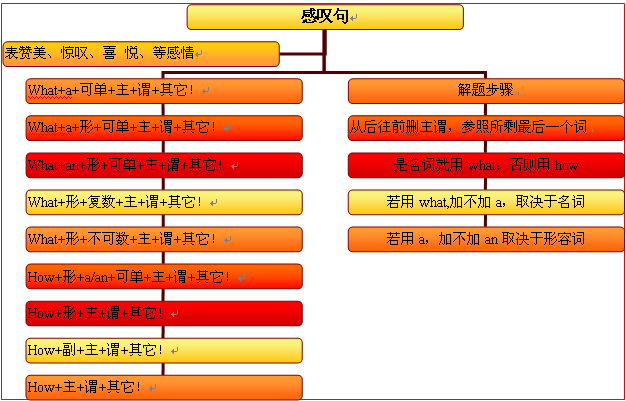
特殊的感叹句表达形式:
1、以副词here, there, in开头的感叹句。
如:Here comes the bus! 公共汽车来了!
There they are! 他们在那儿呢!
2、以疑问词who开头,表示惊奇。
如:Who else will read such a book! 谁还会读这样的书!
3、以情态动词may开头,表示愿望。
如:May you both be happy! 祝二位幸福。
May you succeed! 祝你成功!
4、否定疑问句用作感叹句时,它的意义是肯定的;但肯定疑问句用作感叹句在美国英语中比较常见。
如:Aren't they sweet! 他们多可爱啊!
Am I hungry! 我饿极了!
5、一些短语用作感叹句。
如:Dear me! 哎呀!
My goodness! 嗳呀!
None of your nonsense! 不要胡说了!
6、一些作表语的成分用作感叹句。
如:Just my luck! 又倒霉了!
Sorry, my mistake! 对不起,是我的错!
7、以从句表示的感叹句。
如:As if were my fault! 好像是我的错似的!
To think as candal of this sort should be going on under my roof! 真想不到这种丑事竟然出在我们家里!
状语从句的概念:
状语从句指句子用作状语时,起副词作用的句子。它可以修饰谓语、非谓语动词、定语、状语或整个句子。根据其作用可分为时间、地点、原因、条件、目的、结果、让步、方式和比较等从句。状语从句一般由连词(从属连词)引导,也可以由词组引起。从句位于句首或句中时通常用逗号与主句隔开,位于句尾时可以不用逗号隔开。
比较while/as/when:
1、as/when引导短暂性动作的动词例句:
如:Just as/Just when/When I stopped my car, a man came up to me.
2、当从句的动作发生于主句动作之前,只能用when引导这个从句,不可用as或while。
如:When you have finished your work, you may have a rest.
3、从句表示“随时间推移”连词能用as,不用when或while。
如:As the day went on, the weather got worse.
比较untill/till:
两个连词意义相同,肯定形式表示的意思是“做某事直至某时”,动词必须是延续性的。否定形式表达的意思是“直至某时才做某事”,动词为延续性或非延续性都可以。
正确使用这两个连词的关键之一就在于判断句中的动词该用肯定式还是否定式。
肯定句例句:I slept until midnight. 我一直睡到半夜时醒了。
Wait till I call you. 等着我叫你。
注意:在肯定句中可用before代替:Let's get in the wheat before the sunsets.
否定句例句:She didn't arrive until 6o'clock.
I didn't manage to do it until you had explained how.
1、Until可用于句首,而till通常不用于句首。
例句:Until you told me, I had heard nothing of what happened.
2、Untilwhen疑问句中,until要放在句首。
例句:Until when are you staying? 你呆到什么时候?
注意:否定句可用另外两种句式表示。
1)Not until…在句首,主句用倒装。
例句:Not until the early years of the19th century did man know what heat is.
2)It is not until…that…
状语从句的用种类:
1、时间状语从句:
表示时间的状语从句可由when, as, while, whenever, after, before, till(until), since, once, as soon as(或the moment), by the time, no sooner…than, hardly(scarcely)… when, everytime等引导。
e.g. When I came into the office, the teachers were having a meeting.
He started as soon as he received the news.
Once you see him, you will never forget him.
No sooner had I gone to bed than I went to sleep.
2、原因状语从句:
原因状语从句是表示原因或理由的,引导这类从句的最常用的连词是because, since, as, nowthat(既然)等,for表示因果关系时(它引导的不是从句)为并列连词,语气不如because强。 e.g. He is disappointed because he didn't get the position.
As it is raining, I will not go out.
Now that you mention it, I do remember.
3、地点状语从句:
引导地点状语从句的连词是where和wherever等。
e.g. Sit wherever you like.
Make a mark where you have a question.
4、目的状语从句:
引导目的状语从句最常用的词(组)是so, so that(从句谓语常有情态动词), in order that, in case(以防,以免)等。
e.g. Speak clearly, so that they may understand you.
She has bought the book in order that she could follow the TV lessons.
He left early in case he should miss the train.
5、结果状语从句:
结果状语从句是表示事态结果的从句,通常主句是原因,从句是结果。由so that(从句谓语一般没有情态动词),so…that, such…that等引导。
e.g. She was ill, so that she didn't attend the meeting.
He was so excited that he could not say a word.
She is such a good teacher that everyone admires her.
6、条件状语从句:
条件状语从句分真实性(有可能实现的事情)与非真实性(条件与事实相反或者在说话者看来不大可能实现的事情)条件句。
引导条件状语从句的词(组)主要有if, unless, so(as)long as, on condition that, so(as) far as, if only(=if)。
注意:条件从句中的if不能用whether替换。
e.g. If he is not in the office, he must be out for lunch.
You may borrow the book so long as you keep it clean.
So far as I know(据我所知), he will be away for three months.
You can go swimming on condition that(=if) you don't go too far away from the river bank.
If he had come a few minutes earlier, he could have seen her.
7、让步状语从句:
让步状语从句可由although, though, as, even if(though), however, whatever, whether…or, no matter who(when, what,…)等引导。
注意:as引导的让步状语从句一般是倒装的。
e.g. Though he is a child, he knows a lot.
Child a she is, he knows a lot.
Whatever(=No matter what) you say, I'll never change my mind.
8、方式状语从句:
方式状语从句常由as, as if(though), the way, rather than等引导。
e.g.You must do the exercise as I show you.
He acted as if nothing had happened.
9、比较状语从句:
比较状语从句常用than, so(as)…as, the more…the more等引导。
e.g. I have made a lot more mistakes than you have.
He smokes cigarettes as expensive as he can afford.
The busier he is, the happier he feels.
使用状语从句时要注意的几个问题:
1、在时间和条件(有时也在方式、让步等)从句中,主句是一般将来时,从句通常用一般现在时表示将来。
e.g. We'll go outing if it doesn't rain tomorrow.
I'll write to you as soon as I get to Shanghai.
2、有些时间、地点、条件、方式或让步从句,如果从句的主语与主句主语一致(或虽不一致,是it),从句的谓语又包含动词be,就可省略从句中的“主语+be”部分。
e.g. When(hewas) still a boy of ten, he had to work day and night.
If(you are) asked you may come in.
If(it is) necessary I'll explain to you again.
3、注意区分不同从句:引导的是什么从句,不仅要根据连词,还要根据句子结构和句意来判别。以where为例,能引导多种从句。
e.g. You are to find it where you left it.(地点状语从句)
Tell me the address where he lives.(定语从句,句中有先行词)
I don't know where he came from.(宾语从句)
Where he has gone is not known yet.(主语从句)
This place is where they once hid.(表语从句)
注意:表示“一…就…”的结构 hardly/scarcely…when/before/no sooner…than和as soon as都可以表示“一…就…”的意思。
例句:I had hardly/scarcely got home when it began to rain.
I had no sooner got home than it began to rain.
As soon as I got home, it began to rain.
注意:如果hardly/scarcely或nosooner置于句首,句子必须用倒装结构:
例句:Hardly/Scarcely had I got home when it began to rain.
No sooner had I got home than it began to rain.
与“短文改错This autumn my class went to Dalian to go the cam...”考查相似的试题有:
- Vegetables _________ many kinds of vitamins and many other useful materials. We should eat them_________.A.contain ...
- Be _____we can' t expect an absolute freedom of expression.A.confidentB.creativeC.gratefulD.reasonable
- He came home______yesterday.A.lateB.latterC.latelyD.later
- — The new equipment has brought us a lot of convenience .— Yes. It is _____.[ ]A. usableB. out of useC. in much useD....
- ________ the rapid growth of short messages sent by mobile phones, the increasing number of criminal cases appeared t...
- Einstein liked Bose’s paper so much that he ___ his own work and translated it into German.A.gave offB.turned downC...
- --- When will your school _______ for the summer holiday?--- At the end of this month.A.break downB.break inC.brea...
- Hurry up! I can’t stand ____.Ok .I will arrive at the hotel soon.A keeping to wait B keeping waiting C being kept to ...
- He will _______ you next week if he is free.A.drop inB.drop in atC.drop in onD.call at
- If you don’t know what this means, ________ the dictionary.A.look upB.refer toC.point toD.look through